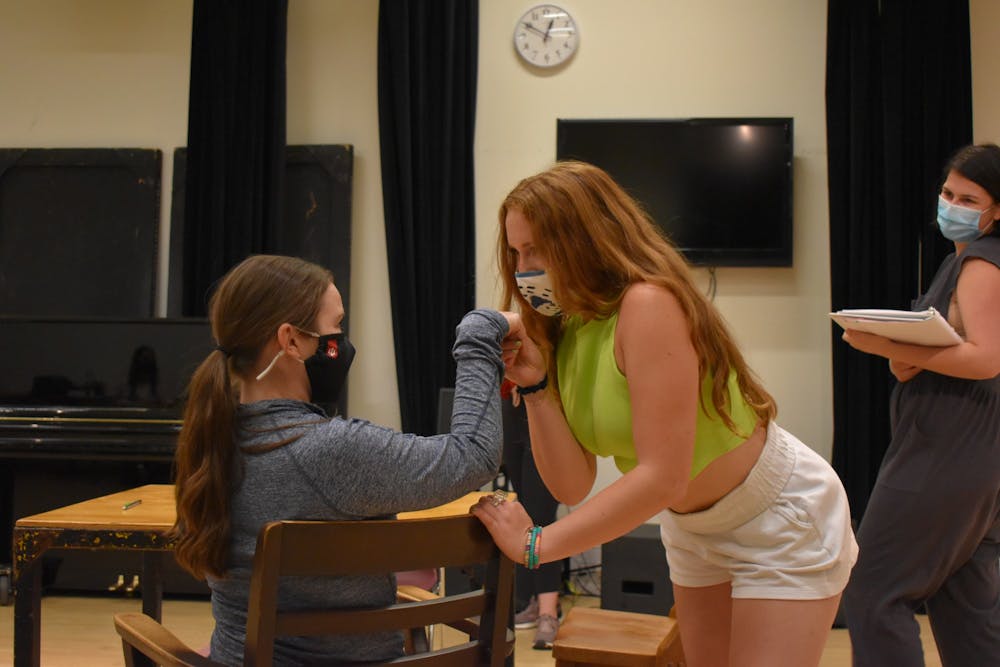For the first couple minutes, “The Well of Horniness” could be a traditional stage comedy. Jokes whiz around the rehearsal space and land well with the audience.
However, a few lines later, the all-female cast is experimenting with a different kind of punchline: shouting dramatically.
The room erupts into laughter. The women wait for half a second, and the show picks up again.
“The Well of Horniness,” a genre-bending, raunchy comedy from playwright Holly Hughes, will open the season for the IU Department of Theatre, Drama, and Contemporary Dance after a year-long hiatus from in-person performances.
The show will run at the Wells-Metz Theatre from Sep. 30 to Oct. 2 with performances taking place at 2 and 7:30 p.m.
Following the outline of a classic whodunit case, the play satirizes many stereotypes about women while reveling in the joy of lesbian identity.
“I enjoy it because I identify with it,” IU sophomore and narrator Maya Owens said. “There aren’t that many comedies about lesbians.”
An ensemble piece, “The Well of Horniness” challenges how lesbian women can be depicted as objects for men within media and pokes fun at the patriarchy, director RJ Hodde said.
It was originally staged in the 1980s at the WOW Café, a historically lesbian theater organization in New York City known for its contributions to avant-garde American theater.
“The most important thing in that moment was for it to be made exclusively by and for women, but also for women who love women,” Hodde said.
Hodde said there is an extensive history of queer comedy in the theater.
“I think the importance of queer comedy is the fact that it makes up so much of the landscape of what queer performance art really is,” Hodde said. “The most ubiquitous queer art that people are familiar with now is drag, which is completely focused on making people laugh.”
Between rehearsals, Hodde also communicates with the show’s playwright Hughes, who will attend the final dress rehearsal of the IU production and serve as the Fall 2021 Collins Memorial Lecturer for the Department of Theatre, Drama, and Contemporary Dance.
Hughes received national attention as a plaintiff in the 1998 “NEA 4” Supreme Court case.
Hodde said in one of the emails between them, Hughes breaks down the purpose of the collective scream, which is a running gag throughout the show. She said it allows women to be loud and take up space.
IU senior Helen Krizman, playing one of the narrators, said the scream is a vehicle for female expression.
“It’s funny because it still kind of rings true to when she wrote it,” Krizman said. “The primal scream — you don’t have to censor yourself or beautify for a man or society.”
The play draws inspiration from many mediums and genres, including film noir and 20th-century TV advertisements.
The story is also told through the lens of camp, Hodde said. Camp typically manifests as playful irony and purposeful “bad taste” during a performance.
When camp is at work, Hodde said the audience knows a particular moment is over the top or even an outright lie, but that’s what makes it so enjoyable to watch.
“Camp is all about celebration, which is why I think it is so empowering for actors to learn, no matter what their sexual orientation or identity,” said Hodde, who researches camp at the graduate level.
During the show, women play misogynistic men — just one of the examples of camp and subversion found throughout the show.
“I think it’s cool that there are men in the show, but they’re played by women,” Owens said. “Women can play men, like women can do whatever we want.”
“It’s like Shakespeare but reversed,” Krizman said in response.




